A few months ago, I came across a free ebook for download called Music Marketing on Twitter by a guy named Johnny Dwinell from Daredevil Productions in Nashville, TN. I’ve downloaded and purchased quite a few social media and marketing books in the past two years, and frankly, the quality can vary quite widely. I was impressed with the substantive and practical social media advice offered in Johnny’s ebook, and I thought it would be interesting to find out more about Johnny and what he’s up to over at Daredevil with his partner, Kelly Schoenfeld.
[Just in case you were wondering, I received no compensation from Johnny or Kelly or anyone else for writing this post. I’ve been approached lately with several offers to post “sponsored content.” I turn them down. If I write that I like something, you should know that it’s because I actually like it.]
Q1: I notice that on your website you list your services as artist development, demo recording, songwriting, and before/after recordings. It seems from your blog that you are moving from being primarily a recording and production studio to branching out into doing social media management and campaigns for artists. Can you talk a little about the history of your company and how your service offerings are evolving? What brought you and the agency to start providing social media management for artists?
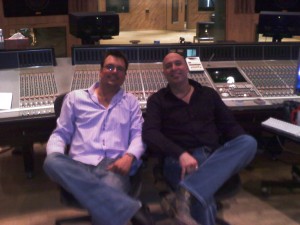 JD: Good Observation, Solveig! Yes, we are in the midst of adding a market development component to our thriving artistic development business. The impetus for this marketing arm was sheer pragmatism. We were very blessed to work with amazingly talented and hard working indie artists who deserve to be heard. The problem was that once we delivered the record – something we inevitably were all very proud of – the artist would walk out the studio door and the project would die right there; they didn’t know how to market it. We felt that artists really need to focus on being artists, and if we could find ways to help them market their records, they would return for a 2nd record with us which would, in turn, increase our sales.
JD: Good Observation, Solveig! Yes, we are in the midst of adding a market development component to our thriving artistic development business. The impetus for this marketing arm was sheer pragmatism. We were very blessed to work with amazingly talented and hard working indie artists who deserve to be heard. The problem was that once we delivered the record – something we inevitably were all very proud of – the artist would walk out the studio door and the project would die right there; they didn’t know how to market it. We felt that artists really need to focus on being artists, and if we could find ways to help them market their records, they would return for a 2nd record with us which would, in turn, increase our sales.
The problem was that once we delivered the record, the artist would walk out the studio door and the project would die right there.
So phase 1 is to create and perfect an online marketing pipeline that is effective at moving units. Phase 2 is to become a proper indie record label where we can sign, develop, record any artist we like knowing that we can recoup the costs through our marketing efforts.
With regards to history, my business partner Kelly Schoenfeld and I have been working together for over a decade. He’s been very busy in Nashville for the last 17 years engineering and producing records (his name is on over 70 million records). I was (amongst other things) developing artists in Los Angeles and producing records. I would always put a trip to Nashville for the mixing stage into the budget because Kelly is so amazing (plus it was a great excuse to hang, LOL) Kelly and I had talked for years about joining forces, it finally happened in 2011; thus, Daredevil Production was born. Our mission is to create a thriving vehicle for indie artists to grow and succeed. This of course absolutely requires commerce!
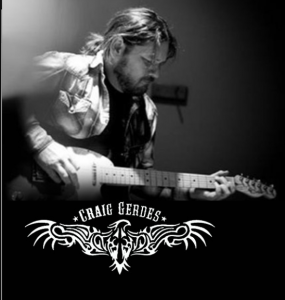 Q2: Can you give us an example (case study) of a specific artist campaign you ran recently where you used Twitter to promote that artist? Give us the artist’s genre and background, fan demographics, why you chose to focus on Twitter, what your goals were, what you measured, tools you used, and what the results were – ie. give us an overview of the social media plan, campaign tactics and results.
Q2: Can you give us an example (case study) of a specific artist campaign you ran recently where you used Twitter to promote that artist? Give us the artist’s genre and background, fan demographics, why you chose to focus on Twitter, what your goals were, what you measured, tools you used, and what the results were – ie. give us an overview of the social media plan, campaign tactics and results.
JD: If we are speaking specifically about Twitter, the most successful campaign was with an artist named Craig Gerdes. We produced 1 very clever song for Craig called “Haggard Fan” that was a story about a blind date where the couple found out they were good together because they both loved Merle Haggard. The chorus of the song incorporated 6 #1 Merle Haggard song titles into the lyrics. So if you were unaware of Merle Haggard the song was awesome and the story made sense. If you were aware of Merle Haggard you were smiling the whole time because you understood the song title references. This particular campaign was done about a year ago and was our first foray into Twitter.
We chose Twitter to learn more about how to make it work and because it was so amazingly surgical. Where would you find a huge group of people that would most likely love that song? Merle Haggard’s Twitter fans of course! We mined them for about 3 months or so offering a free download of the track via an auto-DM feature (when Twitter still allowed URLs in DMs) that offered a link to a squeeze page where we traded the track for an email address for anyone who followed back.
Craig had 20 Twitter followers when we started the campaign. After about 3-4 months we grew his account to 5,000 targeted followers and had well over 2,000 downloads of the song. Sadly, Craig didn’t have a full record to sell but we easily had a few hundred people who were ready, willing, and able to purchase a record! That was very exciting and equally encouraging. You can here the track in a podcast we recorded about producing HERE.
Twitter is extremely effective at finding existing fans for legacy artists as well.
The goal was to find out how powerful Twitter could be. While Twitter isn’t everything, it can certainly be a huge part of a campaign. Twitter is extremely effective at finding existing fans for legacy artists as well. The tools we used were the same in my book: Tweepi, Tweetdeck, SocialOomph, and FriendorFollow.
Q3; What does a social media campaign cost typically (I know they may all be different, depending on goals, but give us a ballpark), and how long would a campaign last?
JD: We can customize a campaign to just about any budget. There is always a start up cost of $2,500 to “build the machine” so-to-speak. This cost is used to build the squeeze page (5% EZ technology and 95% appropriate language, marketing acumen, imagery, and technical structure), build the artist’s online store, brand the artist’s website, etc. Then depending on the momentum and cash flow of the artist, we will incorporate monthly fees for Social Media Expansion, Content Marketing, and Monetization.
Fees can be negotiated up front with a low back end commission on sales, or a low monthly up front fee with a more aggressive back end % on sales. PPC costs are charged to the artist or recouped if it is more of a back end deal; either way artist pays.The length is different for every campaign but, ideally, we would continue until the next release.
Q4: I recently read a blog post http://daredevilmusicproduction.com/social-media/ on your site that mentioned the importance of artists knowing enough to be savvy about spending their marketing dollars with agencies. Tell me a little more about some of the biggest mistakes you see artists making with social media, PR and promotion.
JD: OMG!! just about ALL artists (even multi platinum artists and major labels) and most social media companies are in the dark about certain social media platforms (namely Twitter), effective content marketing, the importance of data collection (aka lead capture), and how to properly engage consumers via each social media platform with respect to how that platform is consumed. For instance Facebook is consumed far differently than Twitter (which is more of a Fire hose of information).
Record Labels and Social Media companies that work with branded label or former label artists are still trying to treat social media exposure as if it was consumed like TV appearances and radio spins. Top down branding methodologies simply don’t work in the 1 on 1 world of “Bottom up” social media interaction. There is a definite lack of knowledge on how to create relationships with consumers via social media because it is counter intuitive to how you create relationships with consumers via mass marketing or “branding”.
On that Craig Gerdes campaign I was messing around with fan interaction. in most cases 3 or 4 sincere tweet interactions with a fan was all that was required to have the fan offering the band a place to stay, free food and drink, and a solid local draw when they came through on tour.
I see indie artists intelligently handing off their social media duties to supposed social media “gurus” because said artists don’t really understand social media. The problem is when you are paying for a service and not getting any results. I recommend everyone “inspect what they expect”.
I see indie artists intelligently handing off their social media duties to supposed social media “gurus” because said artists don’t really understand social media.
We are in the process of signing a band that has had massive exposure through a very popular movie soundtrack that has resulted in some 40,000 paid downloads of the song. the social media company they were paying was failing miserably because all that attention, all those downloads, and the band only had 943 Twitter followers, 3,900 Facebook Likes, and 0 email/phone numbers to speak of. What a complete catastrophe! They should have been fired months ago! We took Craig Gerdes, an unknown unsigned act, and procured over 5,000 targeted fans and over 2,000 downloads/email addresses in half the time! it’s not rocket science but it is a TON of work and a TON of consistency.
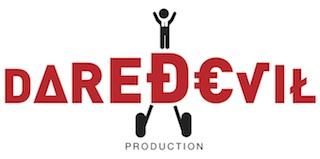 Q5: At what point in their career do you think a DIY artist should turn to an agency to help with their social media? And what types of services do you think are best handled by an agency vs. the artist themselves?
Q5: At what point in their career do you think a DIY artist should turn to an agency to help with their social media? And what types of services do you think are best handled by an agency vs. the artist themselves?
JD: Well that all depends on the band. There are several guys out there like John Oszajca and Rick Barker who offer amazing and accurate information that teaches indie artists to do it themselves. The problem is most artists can’t do it or simply won’t do it.
I understand this dynamic because artists should focus on the art. When to start? Well, whenever you have cash flow and can afford it OR when you get your shot at some exposure like a song placement on a movie or commercial, a serious opening slot on a tour, a TV show appearance, etc. Here is where the indie artist gets REAL busy and needs someone to help them “catch” all the fish they are attracting to the boat. With the appropriate level of exposure, many DIY artists can definitely negotiate inexpensive upfront deals for a piece of the back end.
Q6: What do you expect the artist to provide in terms of content when you run a social media campaign or ongoing services for them? Do you create content as well for them?
JD: We do both. We create content for them and we definitely require artists to “play with us in the sandbox” and regularly be capturing content like Radio interviews, backstage antics, live show videos and photos, signed merch, regular YouTube videos, etc.
Q7: What role do you see social media playing in artist development?
JD: With record labels all but abandoning their artist development departments, artists need to develop themselves and find a way to prove (to the big money/big investors) that their music has value in the marketplace. Social media is definitely the primary method for this task. Artists like Taylor Swift and Brantley Gilbert all had massive social media followings before they ever got record deals or their songs on the radio. Additionally, artists like Noah and Karmin were launched and “blew up” via social media. it’s important to note both Karmin and Noah were extremely CONSISTENT with their social media content.
Artists like Taylor Swift and Brantley Gilbert all had massive social media followings before they ever got record deals or their songs on the radio.
Q8: Do you have any words of advice for musicians regarding social media, social media agencies, and artist promotion in general?
JD: Consistency and Work Ethic! So many people think that they just need to get their “deal” and then everything will be taken care of for them. This perception is categorically inaccurate! Once you get your “deal’ the fight is just BEGINNING! You will have to work harder than ever at that point. So best to get started now understanding how it all works so you can make intelligent, informed decisions when you get your shot.
This business is full of mostly lost artists who were chewed up and spit out because they didn’t understand how to work hard and do good business. If you want to be a prima donna then the industry will treat you as such. The real Icons were awesome at business too.
This business is full of mostly lost artists who were chewed up and spit out because they didn’t understand how to work hard and do good business.
Q9: What types of tools does Daredevil Production use on a daily basis to grow and manage its own social media presence on Twitter and other platforms?
JD: Same tools as I mentioned in the Music Marketing on Twitter 101 book plus a few extras that we will reveal in a follow up book we hope to release during the summer. the nuts and bolts are in the first book though.
Q10: Thanks so much for the great information above. Where can artists read your blog and reach your agency, and how can they download your best-seller Kindle book on Twitter for musicians?
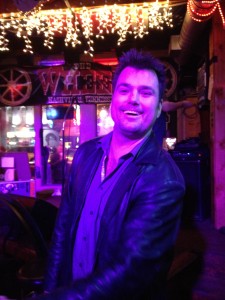 JD: My pleasure, Solveig! Artists can read the blog posts, listen to the podcast episodes (many interviews) at Daredevilproduction.com There is a contact page on the site for anyone that wishes to get in touch with us. The kindle book can be downloaded for free at GiftfromJohnny.com
JD: My pleasure, Solveig! Artists can read the blog posts, listen to the podcast episodes (many interviews) at Daredevilproduction.com There is a contact page on the site for anyone that wishes to get in touch with us. The kindle book can be downloaded for free at GiftfromJohnny.com
Reach me at:
Johnny Dwinell
Daredevil Production
1204 17th Ave. S.
Nashville, TN 37212
818-383-4207
Follow me on Twitter @johnnydwinell

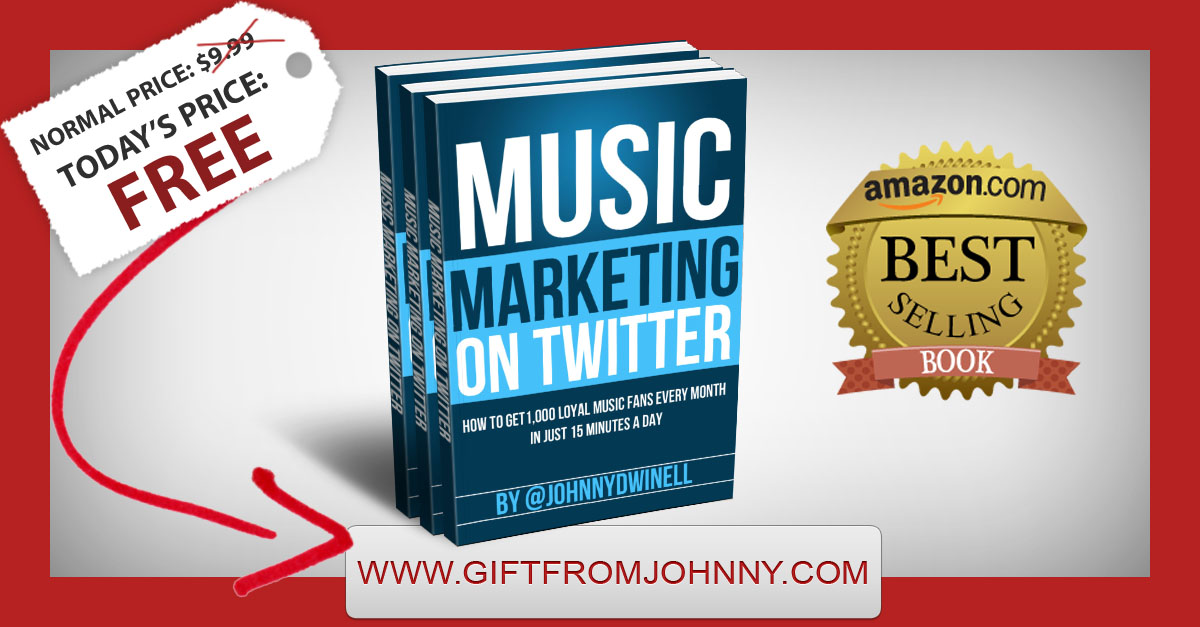

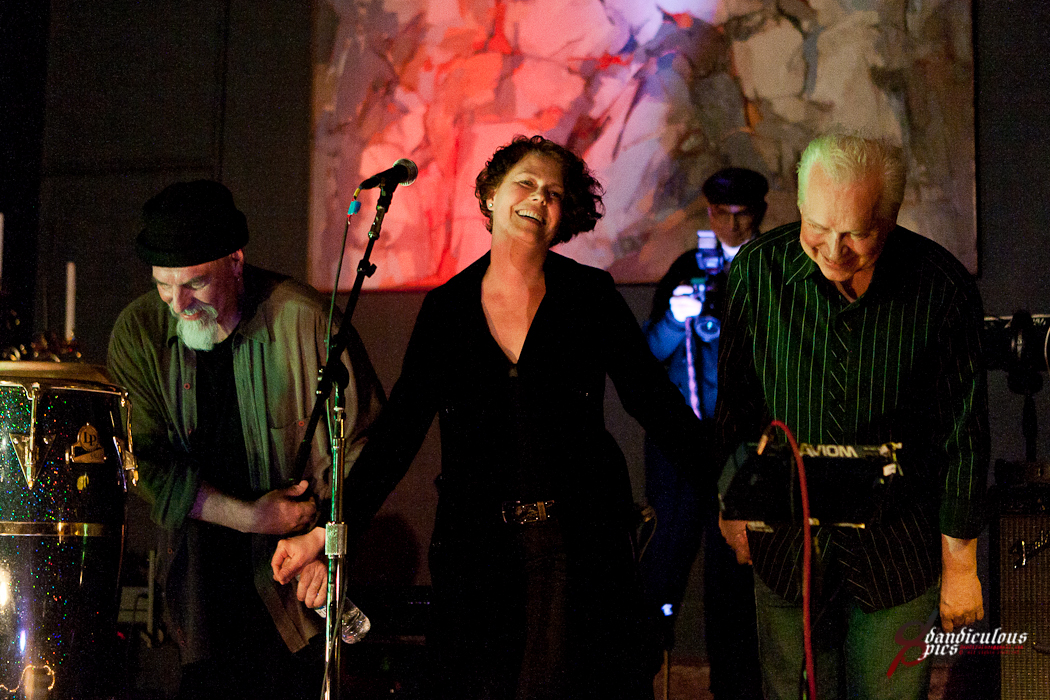
2 comments
Am I missing something here? This hotshot says his big social media play was giving away 2000 copies of an artists single?
So, did the artist make a cent? Apparently not.
And seriously, am I expected to believe his business partner has his name on: “70 million records?”
This appears to be the same old story being spun. Give away your music to grow your social media fan base. But as we all know, social media fans are about as fickle as you can get. Social media “fans” or “likes” DO NOT translate to sales. Simple as that. Even established artists know this.
Chase the likes all you want and pay this Johnny character if you want but you’re pissing your $ down the drain.
Hello, Ruprecht – Thanks for your comment. I always enjoy a skeptical perspective. I don’t think anyone would argue that social media translates directly into sales in any business, but even established artists know it’s the main vehicle today for communicating with fans. Read Taylor Swift’s op-ed in the WSJ today. She attributes a great deal of her success in getting noticed to the community she built on MySpace. I think paying an agency like Johnny’s to help build an artist’s social media presence is not a waste of money, although I think you and I agree it’s not sufficient to build an entire career. While I agree with you that established artists know that their revenue streams cannot be based on social media alone, it’s still a critical component of their success. Social media nurtures a community of fans who will buy tickets to shows (including more expensive VIP “experiences”), merchandise, and download and stream their music. I don’t know an established artist today who doesn’t use social media (or have an agency that uses it for them), and whose record label wouldn’t want as large a Twitter following as they can get.